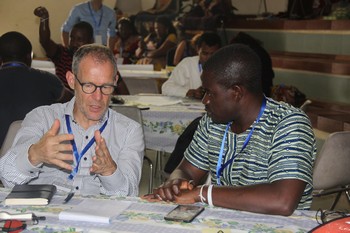
28 Aug 2017 | Focolare Worldwide
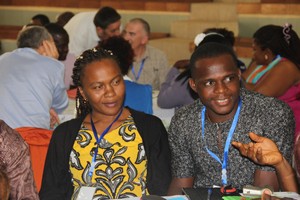 They were from a variety of countries: the Democratic Republic of the Congo, Angola, Uganda, Nigeria, Ivory Coast, Cameroon, Burkina-Faso, Madagascar, Benin and Holland. The fifty five entrepreneurs wanted to put their 30 innovative entrepreneurial projects to the test, with an international force of “mentors” (seven African, five European and one South American). The first African StartUp Lab 2017 was held last June, in the heart of the African forest in Fontem, Cameroon. It consisted of five days of learning how to practice the values of the Economy of Communion that are already being implemented by many entrepreneurs connected with the Economy of Communion around the world. The idea of a week for project development had been conceived two years earlier. In Nairobi, in 2015, during the international assembly of the EoC, several young people had shared with the first generation of EoC entrepreneurs their own dream of realizing several projects. This led to the launch of a two-year incubation period for those projects. In June 2017, during the StartUp Lab held at Mafua Ndem Mariapolis in Fontem, several of those dreams already began to move forward produce.
They were from a variety of countries: the Democratic Republic of the Congo, Angola, Uganda, Nigeria, Ivory Coast, Cameroon, Burkina-Faso, Madagascar, Benin and Holland. The fifty five entrepreneurs wanted to put their 30 innovative entrepreneurial projects to the test, with an international force of “mentors” (seven African, five European and one South American). The first African StartUp Lab 2017 was held last June, in the heart of the African forest in Fontem, Cameroon. It consisted of five days of learning how to practice the values of the Economy of Communion that are already being implemented by many entrepreneurs connected with the Economy of Communion around the world. The idea of a week for project development had been conceived two years earlier. In Nairobi, in 2015, during the international assembly of the EoC, several young people had shared with the first generation of EoC entrepreneurs their own dream of realizing several projects. This led to the launch of a two-year incubation period for those projects. In June 2017, during the StartUp Lab held at Mafua Ndem Mariapolis in Fontem, several of those dreams already began to move forward produce. 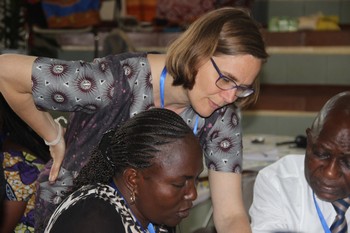 The workshop began with Anouk Grevin, French member of the faculty of the Polytech University of Nantes, and of the Economy and Management course at Sophia University Institute, who presented the fundamental values of the Economy of Communion. Argentinean, Forencia Locascio, expert in social communication, explained the “elevator pitch” that helps to present one’s own entrepreneurial approach to any possible client or investor, in a clear and succinct manner, and in a shor time. French entrepreneur, Pierre Chevalier, presented a workshop on innovative ideas and project analysis, as well as the resources required. The image of an iceberg is perhaps the best way to explain all the effort, work and sacrifice that lies hidden beneath the surface of any successful entrepreneurial project.
The workshop began with Anouk Grevin, French member of the faculty of the Polytech University of Nantes, and of the Economy and Management course at Sophia University Institute, who presented the fundamental values of the Economy of Communion. Argentinean, Forencia Locascio, expert in social communication, explained the “elevator pitch” that helps to present one’s own entrepreneurial approach to any possible client or investor, in a clear and succinct manner, and in a shor time. French entrepreneur, Pierre Chevalier, presented a workshop on innovative ideas and project analysis, as well as the resources required. The image of an iceberg is perhaps the best way to explain all the effort, work and sacrifice that lies hidden beneath the surface of any successful entrepreneurial project.  Topics such as budget, cash flow, sales, production cost and financial reporting were presented by Giampietro Parolin, business strategy instructor at SUI. The practical exercises on product and cost helped in understanding financial components such calculating and sales forecast. Markus Ressl, a consultant from Ressolution and an entrepreneur from the EoC, analyzed different business models with the young people. Markus Ressl, “Ressolution” consultant and EoC entrepreneur, analyzed the theory and practice of different EoC business models with young entrepreneurs. On the last day everyone was back with Locascio for a discussion on communication strategies: company names, logos, slogans and the use of communication tools with different groups of clientele. A symbolic image was presented to each person along with a certificate at the conclusion of the workshop. The symbol showed a network of people gathered around the Mafua Ndem Mariapolis in Cameroon, with a new to do economy. Their arms are raised and linked by a small cord that represents a pact of reciprocity.
Topics such as budget, cash flow, sales, production cost and financial reporting were presented by Giampietro Parolin, business strategy instructor at SUI. The practical exercises on product and cost helped in understanding financial components such calculating and sales forecast. Markus Ressl, a consultant from Ressolution and an entrepreneur from the EoC, analyzed different business models with the young people. Markus Ressl, “Ressolution” consultant and EoC entrepreneur, analyzed the theory and practice of different EoC business models with young entrepreneurs. On the last day everyone was back with Locascio for a discussion on communication strategies: company names, logos, slogans and the use of communication tools with different groups of clientele. A symbolic image was presented to each person along with a certificate at the conclusion of the workshop. The symbol showed a network of people gathered around the Mafua Ndem Mariapolis in Cameroon, with a new to do economy. Their arms are raised and linked by a small cord that represents a pact of reciprocity.
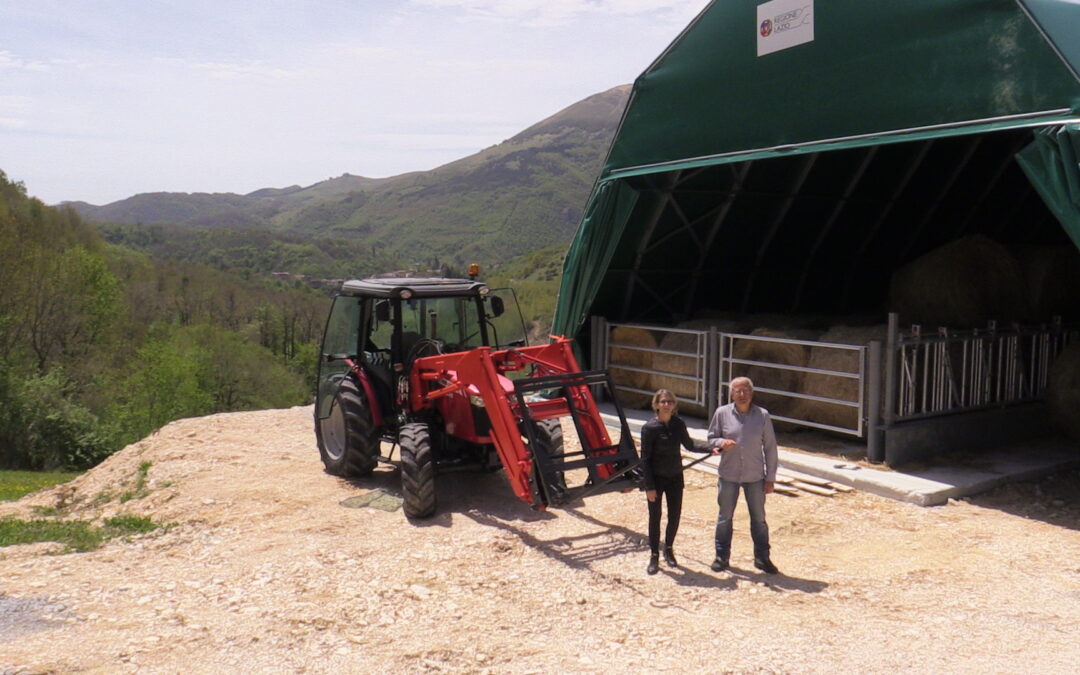
24 Aug 2017 | Focolare Worldwide
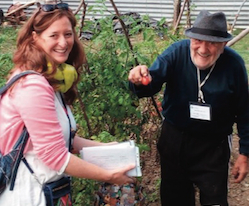 Many people have continued to work after the earthquake in central Italy last year, standing by those who were affected by those who were so awfully affected by that tragedy. It was such a vast catastrophe that it tested not only the physical infrastructure, but also the very social fabric and personal resistance of an entire generation of families. The Focolare Movement has a stable organism that works in collaboration with two associations: United World Project and New Families Association, but also other groups (AIPEC, B&F Foundation, Planetary Embrace, Dialogue in Architecture and local Focolare communities in Italy). They provide expertise in channelling the aid more effectively. “Our first objective was to come up with a way of linking and knowing the different projects so that we could keep awareness high and not forget…” says Cesare Borin from the Focolare’s Emergency Aid project. The financial aid that began to arrive immediately is only one part of many other forms of aid that have solidified the assistance, which involves many people from the Movement in being close to the people who have lost everything in this dramatic event.” The project is comprised of two complimentary efforts:
Many people have continued to work after the earthquake in central Italy last year, standing by those who were affected by those who were so awfully affected by that tragedy. It was such a vast catastrophe that it tested not only the physical infrastructure, but also the very social fabric and personal resistance of an entire generation of families. The Focolare Movement has a stable organism that works in collaboration with two associations: United World Project and New Families Association, but also other groups (AIPEC, B&F Foundation, Planetary Embrace, Dialogue in Architecture and local Focolare communities in Italy). They provide expertise in channelling the aid more effectively. “Our first objective was to come up with a way of linking and knowing the different projects so that we could keep awareness high and not forget…” says Cesare Borin from the Focolare’s Emergency Aid project. The financial aid that began to arrive immediately is only one part of many other forms of aid that have solidified the assistance, which involves many people from the Movement in being close to the people who have lost everything in this dramatic event.” The project is comprised of two complimentary efforts: 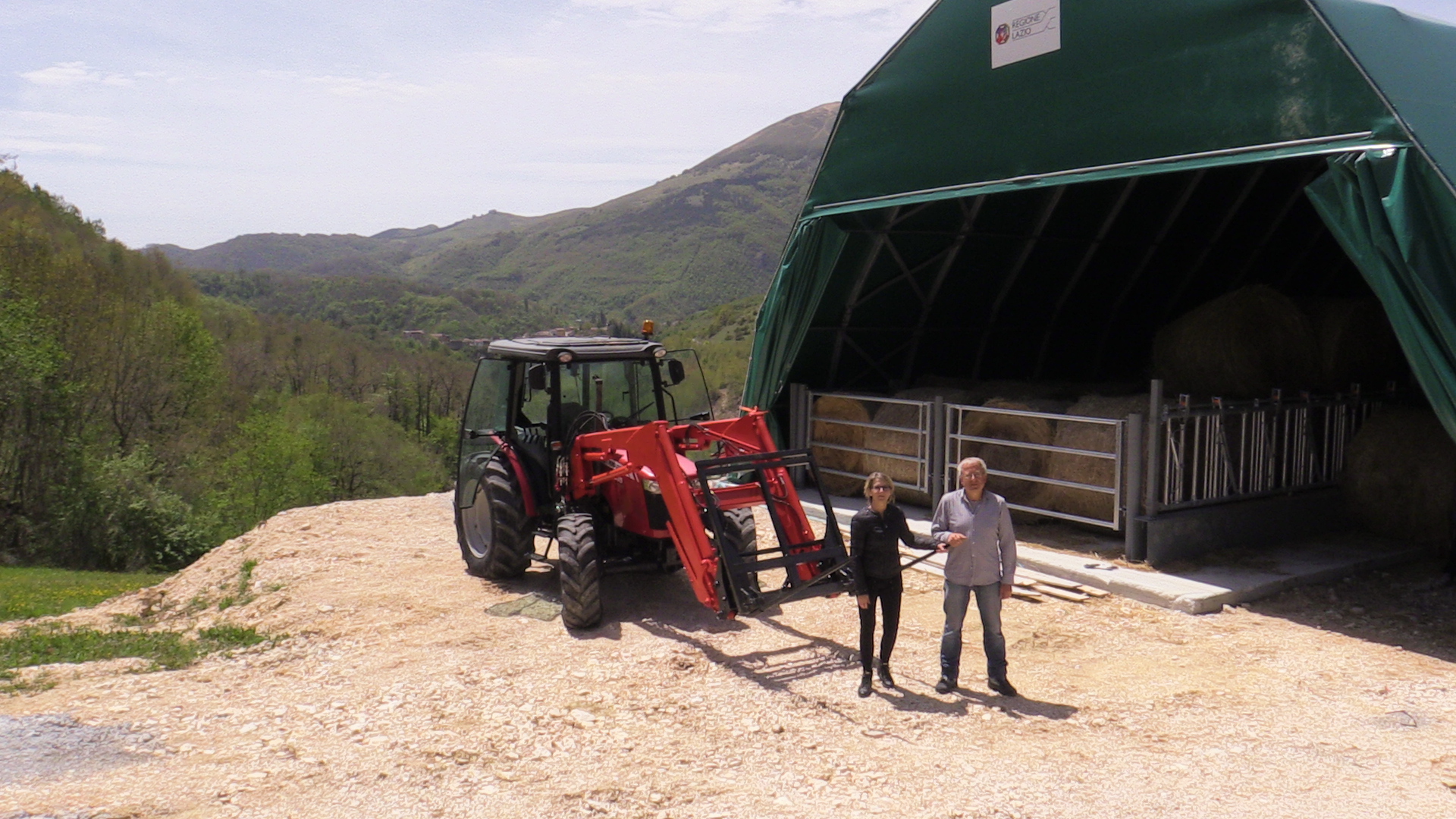 “RImPRESA Businesses” which consists in providing raw materials, machinery and small infrastructure to businesses and, where possible, to strengthen virtuous and ethical business processes and practices that allow for pairing with other businesses on a national level. This effort has focused on 60 small businesses in the four regions that were hit, and they are recently finishing the furnishing of 25 agricultural and handicraft businesses with equipment. The second activity: “RImPRESA GAS” promotes the purchase of products from businesses affected by the earthquake, through the creation of the Gruppi di Acquisto Solidale (GAS) that supports local tourism. Currently, there are 13 agribusinesses with a total of 90 enrolments with a total of 17,000 euros in orders. The response to the people in need was quick, like that for several families from Amatrice that had asked for a sheet metal container. In March they received 10 containers for themselves and many other families of Amatrice and the surrounding areas, at a total cost of 19,000 euros. A summer camp is being set up for the end of August in collaboration with the Italian Caritas, which will be based at Torrita di Amatrice. Activities will continue during the months of July and August with plans for a summer children’s community centre, recreational activities for teenagers from the area, and for the elderly in rehabilitation centres in Borbona. Borin concludes: “The people from these beautiful regions never ask us to rebuild their homes, but they do strongly ask that we don’t leave them all alone! Amongst the lessons learned has been the importance of never marginalising or suffocating the contribution from civil society. Alongside the competent intervention of these state agencies, we need a more vast and programmatic inclusion of social agencies and groups precisely because of their ability to make the work of institutions more efficacious also in restarting the process of production.” Contacts: emergenzaterremoto.italia@focolare.org
“RImPRESA Businesses” which consists in providing raw materials, machinery and small infrastructure to businesses and, where possible, to strengthen virtuous and ethical business processes and practices that allow for pairing with other businesses on a national level. This effort has focused on 60 small businesses in the four regions that were hit, and they are recently finishing the furnishing of 25 agricultural and handicraft businesses with equipment. The second activity: “RImPRESA GAS” promotes the purchase of products from businesses affected by the earthquake, through the creation of the Gruppi di Acquisto Solidale (GAS) that supports local tourism. Currently, there are 13 agribusinesses with a total of 90 enrolments with a total of 17,000 euros in orders. The response to the people in need was quick, like that for several families from Amatrice that had asked for a sheet metal container. In March they received 10 containers for themselves and many other families of Amatrice and the surrounding areas, at a total cost of 19,000 euros. A summer camp is being set up for the end of August in collaboration with the Italian Caritas, which will be based at Torrita di Amatrice. Activities will continue during the months of July and August with plans for a summer children’s community centre, recreational activities for teenagers from the area, and for the elderly in rehabilitation centres in Borbona. Borin concludes: “The people from these beautiful regions never ask us to rebuild their homes, but they do strongly ask that we don’t leave them all alone! Amongst the lessons learned has been the importance of never marginalising or suffocating the contribution from civil society. Alongside the competent intervention of these state agencies, we need a more vast and programmatic inclusion of social agencies and groups precisely because of their ability to make the work of institutions more efficacious also in restarting the process of production.” Contacts: emergenzaterremoto.italia@focolare.org
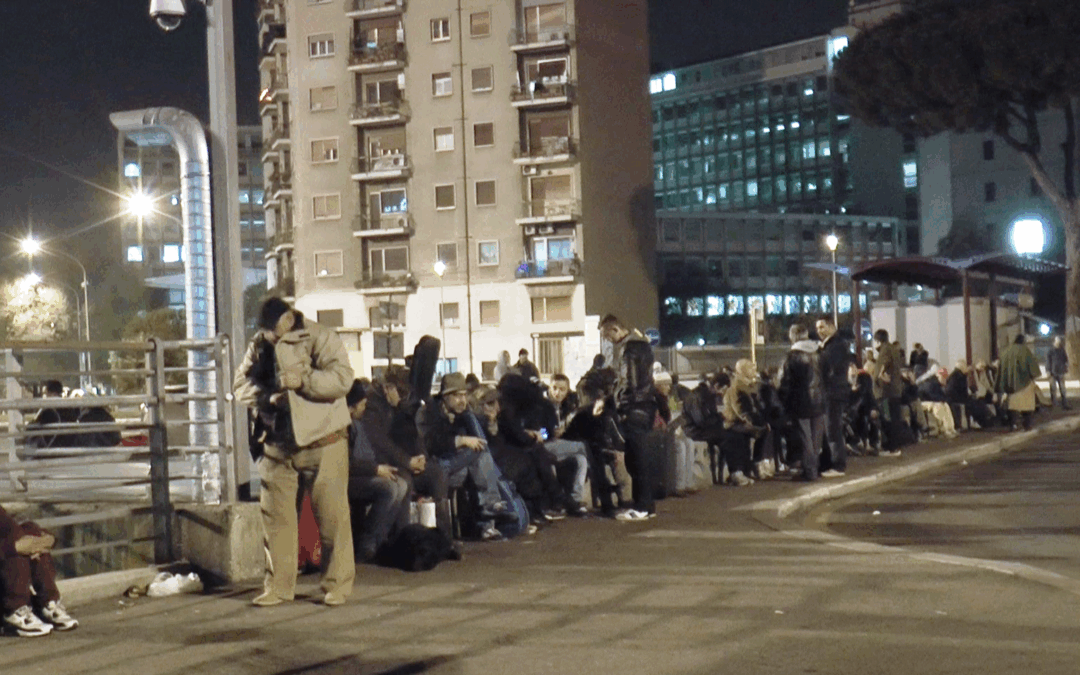
23 Aug 2017 | Focolare Worldwide
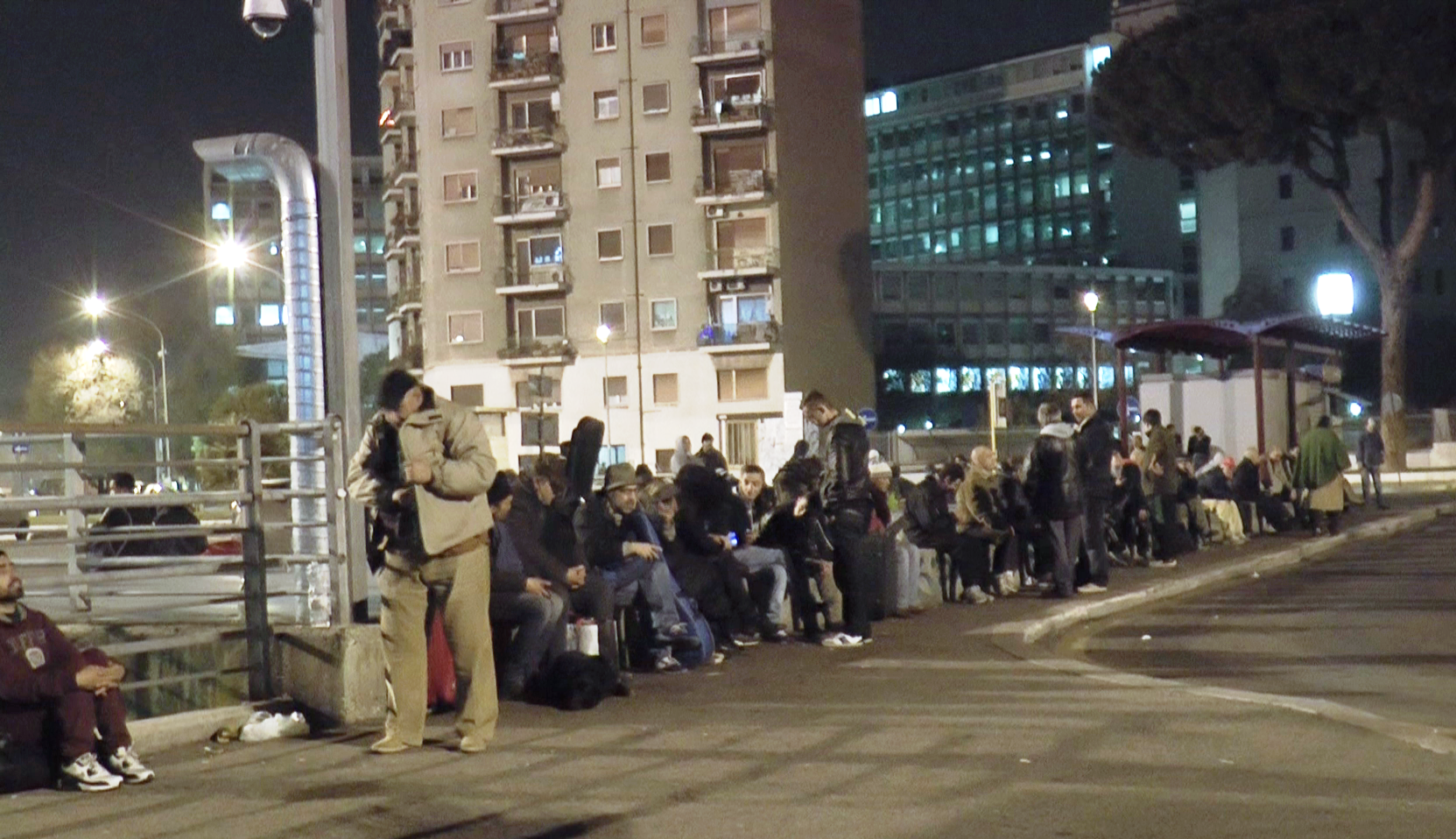 “Re”-turn, “Re”-cognize, “Re”-view, “Re”-embrace, “Re”-member. Going back to Ostiense, I have butterflies in my stomach. I look for my friends in desperation. These past months I left Rome behind with its great beauty (the kind around the train stations, that is). To console me, some have used reassuring expressions like “never mind, you’ll find the poor, the least among us, the homeless, wherever you go.”But I don’t love the poor or the least. I love Samir, Fulvio, Gian Paolo, Gabriele, Jazmin… Ladies and gentlemen, this is called friendship. Claudio treats me with the tenderness of a whisper, although he has a past that is more rough, harsh and violent than anyone. When I was an ocean away, I realized that friendship had changed him, but above all it had changed me. I talk, I listen, I sit down, and I feel truly at home. This sense of “re”-entry and “re”-turn is a bit of a taste of what they call heaven… “re”-acquired after it had been lost. I “re”-listen to their stories and absurdities. Inside myself these past months, I found some pressing questions about the sense of life paths, the paradox of decisions, disrupted plans, and trepidation about my own mission. I tend to get lost in these pretentions, but I see that my friends do not have a path, mission, choices nor even know how to tell their stories. I had become lost in all these middle-class demands, but here and now, I stop getting lost. These are my friends, and it wouldn’t be right to have something for myself that they cannot have. Ladies and gentlemen, this is friendship. As I come out of myself, out of my will, my demands, I continually ask – for them, for me – for the thread… the thread that connects everything under heaven, our stories and all the stories, in a single plan. I ask for it humbly. I “re”-embrace myself, greet myself with wet eyes and say, “Hi Paula, welcome back!”
“Re”-turn, “Re”-cognize, “Re”-view, “Re”-embrace, “Re”-member. Going back to Ostiense, I have butterflies in my stomach. I look for my friends in desperation. These past months I left Rome behind with its great beauty (the kind around the train stations, that is). To console me, some have used reassuring expressions like “never mind, you’ll find the poor, the least among us, the homeless, wherever you go.”But I don’t love the poor or the least. I love Samir, Fulvio, Gian Paolo, Gabriele, Jazmin… Ladies and gentlemen, this is called friendship. Claudio treats me with the tenderness of a whisper, although he has a past that is more rough, harsh and violent than anyone. When I was an ocean away, I realized that friendship had changed him, but above all it had changed me. I talk, I listen, I sit down, and I feel truly at home. This sense of “re”-entry and “re”-turn is a bit of a taste of what they call heaven… “re”-acquired after it had been lost. I “re”-listen to their stories and absurdities. Inside myself these past months, I found some pressing questions about the sense of life paths, the paradox of decisions, disrupted plans, and trepidation about my own mission. I tend to get lost in these pretentions, but I see that my friends do not have a path, mission, choices nor even know how to tell their stories. I had become lost in all these middle-class demands, but here and now, I stop getting lost. These are my friends, and it wouldn’t be right to have something for myself that they cannot have. Ladies and gentlemen, this is friendship. As I come out of myself, out of my will, my demands, I continually ask – for them, for me – for the thread… the thread that connects everything under heaven, our stories and all the stories, in a single plan. I ask for it humbly. I “re”-embrace myself, greet myself with wet eyes and say, “Hi Paula, welcome back!”
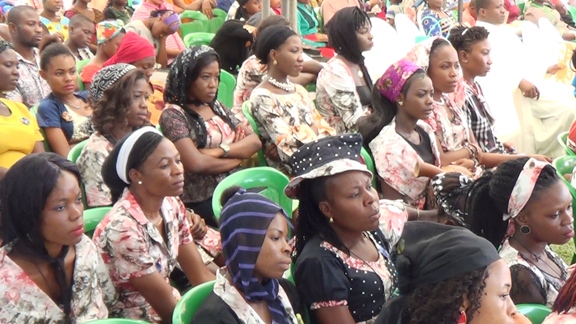
22 Aug 2017 | Focolare Worldwide
“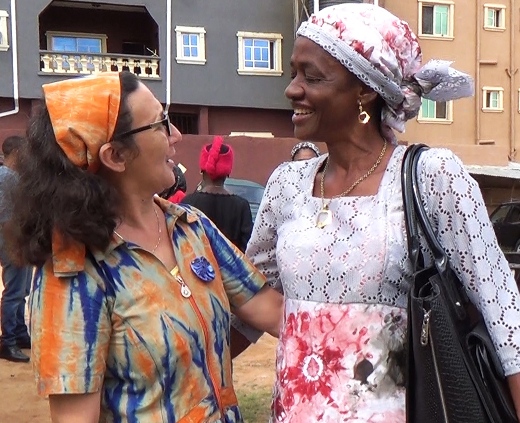 I had only been married a short while when my husband fell gravely ill. At the same time I discovered I was pregnant.” This is how one Nigerian woman’s story begins. Far from her own family and alone, she asked her husband’s family for help, but only found closed doors. “We lived through hell,” she said. Fortunately other doors opened soon after: those of Casa Alba. And for her, like many other young women in difficulty, a new day began. “I don’t know how I would have survived otherwise. Now, thanks to God, things have gotten better.” Casa Alba is one of the Focolare Movement’s projects in Nigeria. For many years, it was once just called a “gen house” (for “new generation”, the young people of the Focolare). Only later did Chiara Lubich propose naming it “Alba” (“dawn”), with the hope that it might become a true house for many vulnerable girls from all over Nigeria. Here many – some were living on the street – have been welcomed and learned a trade. Both sewing work (which became a course in itself) and batik (the art of dying fabric), which at first were just a way to earn some money, have become a true recovery project. Spiritual and ethical training are also integral parts of the program. In May Casa Alba celebrated its 25th anniversary at the Mariapolis Center of Onitsha – an entire weekend with a concluding mass outdoors. Four hundred people were invited, many of whom donned typical brightly colored African coloring, decorated with batik techniques. Auxiliary Bishop Denis Chidi Isizoh, celebrated the mass. “Focolare means fire,” he said during the homily. “It is the fire of encouragement, of evangelization, of love.” He described the times he had met Chiara Lubich personally, when he worked with Cardinal Arinze at the Pontifical Council for Interreligious Dialogue. “A French scholar once wrote, ‘I think therefore I am.’ No African would ever say this. Africans would say ‘We are, therefore I am.’ I am a person because I belong to a community, to a group. This is what the members of the Focolare Movement tell us: when we are united like a community, that is when we find ourselves.”
I had only been married a short while when my husband fell gravely ill. At the same time I discovered I was pregnant.” This is how one Nigerian woman’s story begins. Far from her own family and alone, she asked her husband’s family for help, but only found closed doors. “We lived through hell,” she said. Fortunately other doors opened soon after: those of Casa Alba. And for her, like many other young women in difficulty, a new day began. “I don’t know how I would have survived otherwise. Now, thanks to God, things have gotten better.” Casa Alba is one of the Focolare Movement’s projects in Nigeria. For many years, it was once just called a “gen house” (for “new generation”, the young people of the Focolare). Only later did Chiara Lubich propose naming it “Alba” (“dawn”), with the hope that it might become a true house for many vulnerable girls from all over Nigeria. Here many – some were living on the street – have been welcomed and learned a trade. Both sewing work (which became a course in itself) and batik (the art of dying fabric), which at first were just a way to earn some money, have become a true recovery project. Spiritual and ethical training are also integral parts of the program. In May Casa Alba celebrated its 25th anniversary at the Mariapolis Center of Onitsha – an entire weekend with a concluding mass outdoors. Four hundred people were invited, many of whom donned typical brightly colored African coloring, decorated with batik techniques. Auxiliary Bishop Denis Chidi Isizoh, celebrated the mass. “Focolare means fire,” he said during the homily. “It is the fire of encouragement, of evangelization, of love.” He described the times he had met Chiara Lubich personally, when he worked with Cardinal Arinze at the Pontifical Council for Interreligious Dialogue. “A French scholar once wrote, ‘I think therefore I am.’ No African would ever say this. Africans would say ‘We are, therefore I am.’ I am a person because I belong to a community, to a group. This is what the members of the Focolare Movement tell us: when we are united like a community, that is when we find ourselves.”  Let’s go back for a moment. Some time ago Elde de Souza, who directs Casa Alba, visited Bishop Denis to inform him of funding difficulties that the project was having and that activities would have to be suspended. In response, the bishop renewed his faith in the program and relaunched it. Instead of its closing, he proposed celebrating Casa Alba’s 25th anniversary in grand style. “The Focolare in Nigeria is too quiet!” he said. His proposal was too good to ignore, and the entire community mobilized. Everyone, old and young, got to work. Bishop Denis’s enthusiasm is contagious. “Nigeria is a happy place. We are happy people. Yet some are not, and are in really difficult situations. This is what life is about,” he says, concluding that we are all able to unite our sufferings to those of Jesus on the cross. At the celebration, all the Casa Alba “girls” are present. Some are teens; others are already grandmothers. The celebration is a chance to retrace paths and stories. “It changed me and my life.” “Before I had a short temper, but here I calmed down.” “It is wonderful to hear how this small seed produced so much fruit,” says Mama Regina, 83, one of the early teachers. The next day, the newspaper of the archdiocese (which has 2 million Catholics), called the anniversary “a colorful spectacular.” “The Focolare Movement has dried the tears of hopeless young people, who today live above the poverty line thanks to the skills acquired at Casa Alba.” The event was covered on radio and television, and the regional newspaper printed a call to raise funds to relaunch the project. A new day is beginning for Casa Alba as well.
Let’s go back for a moment. Some time ago Elde de Souza, who directs Casa Alba, visited Bishop Denis to inform him of funding difficulties that the project was having and that activities would have to be suspended. In response, the bishop renewed his faith in the program and relaunched it. Instead of its closing, he proposed celebrating Casa Alba’s 25th anniversary in grand style. “The Focolare in Nigeria is too quiet!” he said. His proposal was too good to ignore, and the entire community mobilized. Everyone, old and young, got to work. Bishop Denis’s enthusiasm is contagious. “Nigeria is a happy place. We are happy people. Yet some are not, and are in really difficult situations. This is what life is about,” he says, concluding that we are all able to unite our sufferings to those of Jesus on the cross. At the celebration, all the Casa Alba “girls” are present. Some are teens; others are already grandmothers. The celebration is a chance to retrace paths and stories. “It changed me and my life.” “Before I had a short temper, but here I calmed down.” “It is wonderful to hear how this small seed produced so much fruit,” says Mama Regina, 83, one of the early teachers. The next day, the newspaper of the archdiocese (which has 2 million Catholics), called the anniversary “a colorful spectacular.” “The Focolare Movement has dried the tears of hopeless young people, who today live above the poverty line thanks to the skills acquired at Casa Alba.” The event was covered on radio and television, and the regional newspaper printed a call to raise funds to relaunch the project. A new day is beginning for Casa Alba as well.
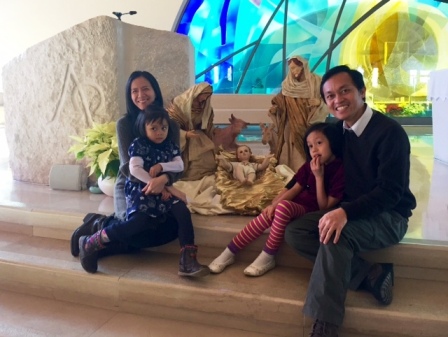
21 Aug 2017 | Focolare Worldwide, Senza categoria
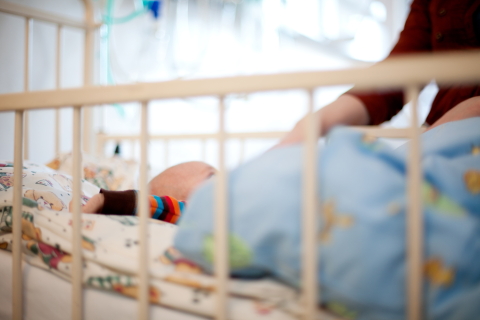 Eugene: My name is Eugene, and this is my wife Ann. We have been married for almost nine years, and have two children; Erin is seven and Anica is almost five. We come from the Philippines and we are here in Italy for a year, to make an experience in the school of families in Loppiano. I am an engineer by profession, and before coming here, I was working in the supply chain department in a power generation company. Ann: I have a degree in Information Technology. When we got married, I was then working in the IT industry. I had what I could say was a successful and flourishing career, and I was going up the corporate ladder. But it was a job that demanded much from me; at a certain point, I felt that to love Eugene and to make our desire of starting a family a reality, I had to put my family above my career. We talked about it together. Around that time, the global financial meltdown was being felt. We had doubts about being able to raise a family with only one income. It was a big risk. But we felt strongly that it was what God was asking from us, and we said our yes, trusting that God would always take care of us. I left my 10-year IT career and became a housewife, and Eugene became the sole provider for our family. Soon after, we found out that we were going to have our first baby and we were very excited. Erin was born. It was a joyful an exciting moment for us. But our joy was short-lived. Two weeks later, on December 6, we had difficulty feeding her. We brought her to the hospital, and the doctor told us that she had sepsis and meningitis, which was potentially fatal. December 7 was a special day for us. We started the day renewing our ‘yes’ to God’s will, believing that everything was part of His great love for our family. Very early that morning, the doctor called to inform us that the infection was apparently at an advanced stage and that Erin was in a very critical condition. That afternoon, we had Erin’s emergency baptism at the neonatal ICU.
Eugene: My name is Eugene, and this is my wife Ann. We have been married for almost nine years, and have two children; Erin is seven and Anica is almost five. We come from the Philippines and we are here in Italy for a year, to make an experience in the school of families in Loppiano. I am an engineer by profession, and before coming here, I was working in the supply chain department in a power generation company. Ann: I have a degree in Information Technology. When we got married, I was then working in the IT industry. I had what I could say was a successful and flourishing career, and I was going up the corporate ladder. But it was a job that demanded much from me; at a certain point, I felt that to love Eugene and to make our desire of starting a family a reality, I had to put my family above my career. We talked about it together. Around that time, the global financial meltdown was being felt. We had doubts about being able to raise a family with only one income. It was a big risk. But we felt strongly that it was what God was asking from us, and we said our yes, trusting that God would always take care of us. I left my 10-year IT career and became a housewife, and Eugene became the sole provider for our family. Soon after, we found out that we were going to have our first baby and we were very excited. Erin was born. It was a joyful an exciting moment for us. But our joy was short-lived. Two weeks later, on December 6, we had difficulty feeding her. We brought her to the hospital, and the doctor told us that she had sepsis and meningitis, which was potentially fatal. December 7 was a special day for us. We started the day renewing our ‘yes’ to God’s will, believing that everything was part of His great love for our family. Very early that morning, the doctor called to inform us that the infection was apparently at an advanced stage and that Erin was in a very critical condition. That afternoon, we had Erin’s emergency baptism at the neonatal ICU.  Eugene: The next day, Erin’s pulse started to drop. She was pale and weak, and her eyes were not responding to movement and light. At once, the doctor advised us to transfer her to a better-equipped hospital, which, naturally, was also more expensive. At first, I was worried because we could not afford the rates of that hospital. But Ann helped me make a leap of faith, and we agreed to do everything for Erin and worry about the expenses later. That morning, I couldn’t accept what was happening to our family. I asked God, “WHY?” but later, entrusting everything to Him, I gave Him my ‘yes.’ In the ambulance on the way to the new hospital, I was asked to stimulate Erin by touching her and singing her favorite lullaby because her pulse was dropping. It was hard to understand why our young family had to go through all this. But we continued to believe that there was a reason for everything, even if we could not understand it at that moment. Once again, Ann and I said our ‘yes’ to His will. Arriving at the emergency room, we watched as Erin was pierced with needles, connected to tubes and surrounded by machines. We watched her go into a seizure. We could not help but cry, seeing everything that was being done to her and realizing the gravity of her illness. I was at a loss and couldn’t understand why our baby had to go through all those painful medical procedures. That day was December 8, the feast of Mary’s Immaculate Conception. We went to the hospital chapel and entrusted Erin to our Lady. Ann: The doctors told us right away that Erin’s condition was very critical, that the infection seemed to have already reached her brain and that she had meningitis. They also told us that upfront that in cases as grave as this, they had only seen two outcomes in the past—either the patient did not live, or the patient survived but with a handicap. They assured us that they would do everything they could, but that we could only hope and pray. Various tests were run on her the entire day. Again, Erin had to undergo the ordeal of being pierced many times with needles while tubes and machines were connected to her arms and feet. Transfusions were ordered for platelets, fresh frozen plasma and red blood cells. She resembled a small Jesus being crucified, suffering and helpless. It was hard to see her go through this, but we also felt how special she was to Jesus, who had chosen her, at such a tender age, to be an innocent victim like Him on the cross. There was really nothing we could do but be there for her, staying “at the foot of her cross” as Mary had done when Jesus was on the cross. Eugene: While Erin was going through physical pain, Ann and I underwent a great deal of emotional pain. Many times, Ann and I would look at each other, assuring one another of our love and unity in this suffering. Though we couldn’t understand why we had to go through this, we continued to believe that it was part of God’s great design for our baby and our family. Absurd as it was, we still believed that this suffering was the immense love of God for us. That night, Ann and I asked ourselves if we were ready for anything: for the possibility of raising a handicapped child, even for the possibility that she would not make it at all, and we would lose her. I asked God, “Are You asking me to give You even my only daughter?” Ann remembered Abraham, who continued to trust, even when he was asked to sacrifice Isaac. She also remembered Job, who remained faithful even when he had lost everything, peacefully saying, “The Lord gives, the Lord takes away.” It was not easy to accept these harsh possibilities, but together, we accepted His will, realizing in that moment that Erin was not ours; she belonged to God. Ann: We prepared ourselves for the worst. But as days passed, we found each day giving us more and more reasons to hope. Erin responded remarkably to the treatment that was given to her. Her color returned, and her skin quality improved. Her eyes started to respond again. She became more mobile. Her cranial ultrasound showed that her brain was normal despite the gravity of the infection. All other tests done on her showed normal results, without a trace of the infection. Soon, the doctors and the nurses were calling her “a miracle baby.” Day after day, she became better and stronger. We watched our little woman bravely fight to live, and as we went through the experience with her, we re-learned important things in life which we might have started to take for granted. In a way, she was teaching us to “BE” more rather than to HAVE or DO more. She was teaching us what life was all about. Eugene: It was Christmas time, and in the midst of the many uncertainties, I was reminded of what Chiara Lubich affirmed one Christmas–that God alone is the source of joy and complete happiness. I also read the Pope’s message–that Christmas is a reminder of that little family of Nazareth, a seemingly unfortunate family that had to go through a lot of difficulties when Jesus was born. As we lived the experience with Erin, it was like a real-life meditation, a constant chance to meet Jesus and choose Him again and again, sometimes on the cross, sometimes in the resurrection. We were not always strong. But what sustained us was the presence of Jesus in our midst, with the Focolare community, and also the support of our family and friends. We felt God’s concrete love through the many people who came forward to help us–practically, financially, emotionally, spiritually–and through countless others who prayed for Erin and for us. Ann: Erin stayed in the hospital for 23 days. We had many celebrations in the hospital: my birthday, Erin’s first month, and our first Christmas as a family of three. But if there was anything worth celebrating and being grateful for, it was the gift of a new life for Erin. We went home on December 29, just in time for the New Year. During her first year of life, we continued to go to different doctors for follow-up check-ups, with consistently normal results. Just before she turned one-year old, she passed her neurological evaluation with flying colors, exceeding her neurologist’s expectations. Now, Erin is seven years old, living life spiritedly with our second daughter Anica who is almost five years old. We are here in Italy for one year to make an experience in the school for families in Loppiano. Like most parents, we also have our concerns, challenges and worries about our children. But we have already entrusted them and their future to God to whom they belong in the first place. We realize that as parents, we are only stewards with a role to accompany these children as they grow up, helping them to correspond to God’s beautiful plan of love for their lives.
Eugene: The next day, Erin’s pulse started to drop. She was pale and weak, and her eyes were not responding to movement and light. At once, the doctor advised us to transfer her to a better-equipped hospital, which, naturally, was also more expensive. At first, I was worried because we could not afford the rates of that hospital. But Ann helped me make a leap of faith, and we agreed to do everything for Erin and worry about the expenses later. That morning, I couldn’t accept what was happening to our family. I asked God, “WHY?” but later, entrusting everything to Him, I gave Him my ‘yes.’ In the ambulance on the way to the new hospital, I was asked to stimulate Erin by touching her and singing her favorite lullaby because her pulse was dropping. It was hard to understand why our young family had to go through all this. But we continued to believe that there was a reason for everything, even if we could not understand it at that moment. Once again, Ann and I said our ‘yes’ to His will. Arriving at the emergency room, we watched as Erin was pierced with needles, connected to tubes and surrounded by machines. We watched her go into a seizure. We could not help but cry, seeing everything that was being done to her and realizing the gravity of her illness. I was at a loss and couldn’t understand why our baby had to go through all those painful medical procedures. That day was December 8, the feast of Mary’s Immaculate Conception. We went to the hospital chapel and entrusted Erin to our Lady. Ann: The doctors told us right away that Erin’s condition was very critical, that the infection seemed to have already reached her brain and that she had meningitis. They also told us that upfront that in cases as grave as this, they had only seen two outcomes in the past—either the patient did not live, or the patient survived but with a handicap. They assured us that they would do everything they could, but that we could only hope and pray. Various tests were run on her the entire day. Again, Erin had to undergo the ordeal of being pierced many times with needles while tubes and machines were connected to her arms and feet. Transfusions were ordered for platelets, fresh frozen plasma and red blood cells. She resembled a small Jesus being crucified, suffering and helpless. It was hard to see her go through this, but we also felt how special she was to Jesus, who had chosen her, at such a tender age, to be an innocent victim like Him on the cross. There was really nothing we could do but be there for her, staying “at the foot of her cross” as Mary had done when Jesus was on the cross. Eugene: While Erin was going through physical pain, Ann and I underwent a great deal of emotional pain. Many times, Ann and I would look at each other, assuring one another of our love and unity in this suffering. Though we couldn’t understand why we had to go through this, we continued to believe that it was part of God’s great design for our baby and our family. Absurd as it was, we still believed that this suffering was the immense love of God for us. That night, Ann and I asked ourselves if we were ready for anything: for the possibility of raising a handicapped child, even for the possibility that she would not make it at all, and we would lose her. I asked God, “Are You asking me to give You even my only daughter?” Ann remembered Abraham, who continued to trust, even when he was asked to sacrifice Isaac. She also remembered Job, who remained faithful even when he had lost everything, peacefully saying, “The Lord gives, the Lord takes away.” It was not easy to accept these harsh possibilities, but together, we accepted His will, realizing in that moment that Erin was not ours; she belonged to God. Ann: We prepared ourselves for the worst. But as days passed, we found each day giving us more and more reasons to hope. Erin responded remarkably to the treatment that was given to her. Her color returned, and her skin quality improved. Her eyes started to respond again. She became more mobile. Her cranial ultrasound showed that her brain was normal despite the gravity of the infection. All other tests done on her showed normal results, without a trace of the infection. Soon, the doctors and the nurses were calling her “a miracle baby.” Day after day, she became better and stronger. We watched our little woman bravely fight to live, and as we went through the experience with her, we re-learned important things in life which we might have started to take for granted. In a way, she was teaching us to “BE” more rather than to HAVE or DO more. She was teaching us what life was all about. Eugene: It was Christmas time, and in the midst of the many uncertainties, I was reminded of what Chiara Lubich affirmed one Christmas–that God alone is the source of joy and complete happiness. I also read the Pope’s message–that Christmas is a reminder of that little family of Nazareth, a seemingly unfortunate family that had to go through a lot of difficulties when Jesus was born. As we lived the experience with Erin, it was like a real-life meditation, a constant chance to meet Jesus and choose Him again and again, sometimes on the cross, sometimes in the resurrection. We were not always strong. But what sustained us was the presence of Jesus in our midst, with the Focolare community, and also the support of our family and friends. We felt God’s concrete love through the many people who came forward to help us–practically, financially, emotionally, spiritually–and through countless others who prayed for Erin and for us. Ann: Erin stayed in the hospital for 23 days. We had many celebrations in the hospital: my birthday, Erin’s first month, and our first Christmas as a family of three. But if there was anything worth celebrating and being grateful for, it was the gift of a new life for Erin. We went home on December 29, just in time for the New Year. During her first year of life, we continued to go to different doctors for follow-up check-ups, with consistently normal results. Just before she turned one-year old, she passed her neurological evaluation with flying colors, exceeding her neurologist’s expectations. Now, Erin is seven years old, living life spiritedly with our second daughter Anica who is almost five years old. We are here in Italy for one year to make an experience in the school for families in Loppiano. Like most parents, we also have our concerns, challenges and worries about our children. But we have already entrusted them and their future to God to whom they belong in the first place. We realize that as parents, we are only stewards with a role to accompany these children as they grow up, helping them to correspond to God’s beautiful plan of love for their lives.
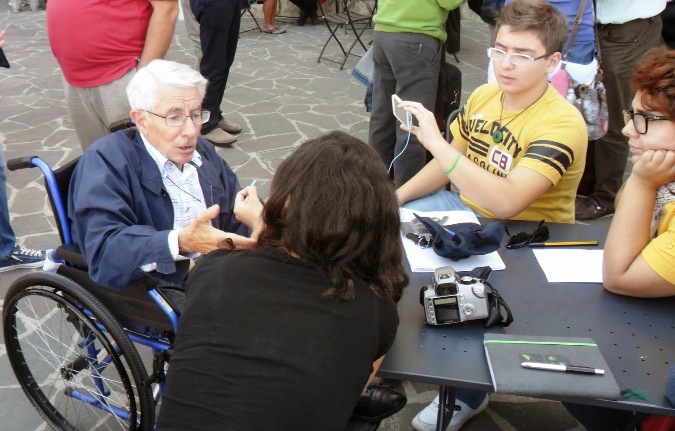
18 Aug 2017 | Focolare Worldwide
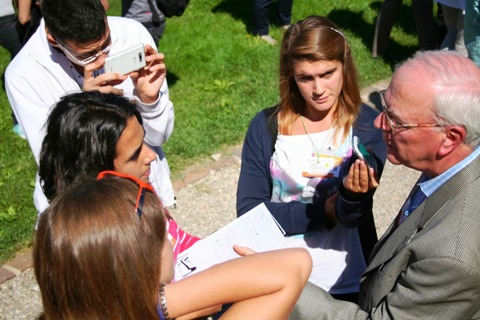 Who like me, while wanting to give the best of themselves, has found it a little difficult at times? We wanted to treat the people around us well, but we spoke badly; we wanted to help, but our egoism got in the way. That’s why several of my friends and I came up with a solution. It all began with two of us who were finding it hard to always give the best of themselves, and they realized they needed to find a way to support one another’s efforts, since it’s easier to love and respect others when you know that there’s someone else on your side that’s trying to do the same. A “pact” was beginning to be born that would help each of us to be more constant with the challenge of giving the best of ourselves in our relationships with other people. But that promise didn’t end with us. In fact, they told others about it, and those people found themselves in the same predicament.
Who like me, while wanting to give the best of themselves, has found it a little difficult at times? We wanted to treat the people around us well, but we spoke badly; we wanted to help, but our egoism got in the way. That’s why several of my friends and I came up with a solution. It all began with two of us who were finding it hard to always give the best of themselves, and they realized they needed to find a way to support one another’s efforts, since it’s easier to love and respect others when you know that there’s someone else on your side that’s trying to do the same. A “pact” was beginning to be born that would help each of us to be more constant with the challenge of giving the best of ourselves in our relationships with other people. But that promise didn’t end with us. In fact, they told others about it, and those people found themselves in the same predicament.  At that point we took the promise too, and really put our selves into it. We even found a “sign” that would help ut remember the daily “pact” and that would support us: a wristband of white twine. We interiorized the “pact” and made it part of our life. Since it helped us so much, we decided to spread it around the city, telling everyone we knew about our experience with it. This set off a chain reaction and the news about the “pact” began to spread all over Italy. In recent months we’ve received so many pictures and expriences of people who have accepted the challenge; so now we’d like to invite everyone who would be interested to put on a white wristband and take the challenge with us. If you’d like more information, or would like to tell us about yourself , the good things that have happened when you tried to give the best of yourself in every moment, write to us at: ilpattobraccialetto@gmail.com Some of your testimonies will be published in our Teens Magazine. From: Teens online
At that point we took the promise too, and really put our selves into it. We even found a “sign” that would help ut remember the daily “pact” and that would support us: a wristband of white twine. We interiorized the “pact” and made it part of our life. Since it helped us so much, we decided to spread it around the city, telling everyone we knew about our experience with it. This set off a chain reaction and the news about the “pact” began to spread all over Italy. In recent months we’ve received so many pictures and expriences of people who have accepted the challenge; so now we’d like to invite everyone who would be interested to put on a white wristband and take the challenge with us. If you’d like more information, or would like to tell us about yourself , the good things that have happened when you tried to give the best of yourself in every moment, write to us at: ilpattobraccialetto@gmail.com Some of your testimonies will be published in our Teens Magazine. From: Teens online

 They were from a variety of countries: the Democratic Republic of the Congo, Angola, Uganda, Nigeria, Ivory Coast, Cameroon, Burkina-Faso, Madagascar, Benin and Holland. The fifty five entrepreneurs wanted to put their 30 innovative entrepreneurial projects to the test, with an international force of “mentors” (seven African, five European and one South American). The first African StartUp Lab 2017 was held last June, in the heart of the African forest in Fontem, Cameroon. It consisted of five days of learning how to practice the values of the Economy of Communion that are already being implemented by many entrepreneurs connected with the Economy of Communion around the world. The idea of a week for project development had been conceived two years earlier. In Nairobi, in 2015, during the international assembly of the EoC, several young people had shared with the first generation of EoC entrepreneurs their own dream of realizing several projects. This led to the launch of a two-year incubation period for those projects. In June 2017, during the StartUp Lab held at Mafua Ndem Mariapolis in Fontem, several of those dreams already began to move forward produce.
They were from a variety of countries: the Democratic Republic of the Congo, Angola, Uganda, Nigeria, Ivory Coast, Cameroon, Burkina-Faso, Madagascar, Benin and Holland. The fifty five entrepreneurs wanted to put their 30 innovative entrepreneurial projects to the test, with an international force of “mentors” (seven African, five European and one South American). The first African StartUp Lab 2017 was held last June, in the heart of the African forest in Fontem, Cameroon. It consisted of five days of learning how to practice the values of the Economy of Communion that are already being implemented by many entrepreneurs connected with the Economy of Communion around the world. The idea of a week for project development had been conceived two years earlier. In Nairobi, in 2015, during the international assembly of the EoC, several young people had shared with the first generation of EoC entrepreneurs their own dream of realizing several projects. This led to the launch of a two-year incubation period for those projects. In June 2017, during the StartUp Lab held at Mafua Ndem Mariapolis in Fontem, several of those dreams already began to move forward produce.  The workshop began with Anouk Grevin, French member of the faculty of the Polytech University of Nantes, and of the Economy and Management course at Sophia University Institute, who presented the fundamental values of the Economy of Communion. Argentinean, Forencia Locascio, expert in social communication, explained the “elevator pitch” that helps to present one’s own entrepreneurial approach to any possible client or investor, in a clear and succinct manner, and in a shor time. French entrepreneur, Pierre Chevalier, presented a workshop on innovative ideas and project analysis, as well as the resources required. The image of an iceberg is perhaps the best way to explain all the effort, work and sacrifice that lies hidden beneath the surface of any successful entrepreneurial project.
The workshop began with Anouk Grevin, French member of the faculty of the Polytech University of Nantes, and of the Economy and Management course at Sophia University Institute, who presented the fundamental values of the Economy of Communion. Argentinean, Forencia Locascio, expert in social communication, explained the “elevator pitch” that helps to present one’s own entrepreneurial approach to any possible client or investor, in a clear and succinct manner, and in a shor time. French entrepreneur, Pierre Chevalier, presented a workshop on innovative ideas and project analysis, as well as the resources required. The image of an iceberg is perhaps the best way to explain all the effort, work and sacrifice that lies hidden beneath the surface of any successful entrepreneurial project.  Topics such as budget, cash flow, sales, production cost and financial reporting were presented by Giampietro Parolin, business strategy instructor at SUI. The practical exercises on product and cost helped in understanding financial components such calculating and sales forecast. Markus Ressl, a consultant from Ressolution and an entrepreneur from the EoC, analyzed different business models with the young people. Markus Ressl, “Ressolution” consultant and EoC entrepreneur, analyzed the theory and practice of different EoC business models with young entrepreneurs. On the last day everyone was back with Locascio for a discussion on communication strategies: company names, logos, slogans and the use of communication tools with different groups of clientele. A symbolic image was presented to each person along with a certificate at the conclusion of the workshop. The symbol showed a network of people gathered around the Mafua Ndem Mariapolis in Cameroon, with a new to do economy. Their arms are raised and linked by a small cord that represents a pact of reciprocity.
Topics such as budget, cash flow, sales, production cost and financial reporting were presented by Giampietro Parolin, business strategy instructor at SUI. The practical exercises on product and cost helped in understanding financial components such calculating and sales forecast. Markus Ressl, a consultant from Ressolution and an entrepreneur from the EoC, analyzed different business models with the young people. Markus Ressl, “Ressolution” consultant and EoC entrepreneur, analyzed the theory and practice of different EoC business models with young entrepreneurs. On the last day everyone was back with Locascio for a discussion on communication strategies: company names, logos, slogans and the use of communication tools with different groups of clientele. A symbolic image was presented to each person along with a certificate at the conclusion of the workshop. The symbol showed a network of people gathered around the Mafua Ndem Mariapolis in Cameroon, with a new to do economy. Their arms are raised and linked by a small cord that represents a pact of reciprocity.

 Many people have continued to work after the earthquake in central Italy last year, standing by those who were affected by those who were so awfully affected by that tragedy. It was such a vast catastrophe that it tested not only the physical infrastructure, but also the very social fabric and personal resistance of an entire generation of families. The Focolare Movement has a stable organism that works in collaboration with two associations: United World Project and New Families Association, but also other groups (AIPEC, B&F Foundation, Planetary Embrace, Dialogue in Architecture and local Focolare communities in Italy). They provide expertise in channelling the aid more effectively. “Our first objective was to come up with a way of linking and knowing the different projects so that we could keep awareness high and not forget…” says Cesare Borin from the Focolare’s Emergency Aid project. The financial aid that began to arrive immediately is only one part of many other forms of aid that have solidified the assistance, which involves many people from the Movement in being close to the people who have lost everything in this dramatic event.” The project is comprised of two complimentary efforts:
Many people have continued to work after the earthquake in central Italy last year, standing by those who were affected by those who were so awfully affected by that tragedy. It was such a vast catastrophe that it tested not only the physical infrastructure, but also the very social fabric and personal resistance of an entire generation of families. The Focolare Movement has a stable organism that works in collaboration with two associations: United World Project and New Families Association, but also other groups (AIPEC, B&F Foundation, Planetary Embrace, Dialogue in Architecture and local Focolare communities in Italy). They provide expertise in channelling the aid more effectively. “Our first objective was to come up with a way of linking and knowing the different projects so that we could keep awareness high and not forget…” says Cesare Borin from the Focolare’s Emergency Aid project. The financial aid that began to arrive immediately is only one part of many other forms of aid that have solidified the assistance, which involves many people from the Movement in being close to the people who have lost everything in this dramatic event.” The project is comprised of two complimentary efforts:  “RImPRESA Businesses” which consists in providing raw materials, machinery and small infrastructure to businesses and, where possible, to strengthen virtuous and ethical business processes and practices that allow for pairing with other businesses on a national level. This effort has focused on 60 small businesses in the four regions that were hit, and they are recently finishing the furnishing of 25 agricultural and handicraft businesses with equipment. The second activity: “RImPRESA GAS” promotes the purchase of products from businesses affected by the earthquake, through the creation of the Gruppi di Acquisto Solidale (GAS) that supports local tourism. Currently, there are 13 agribusinesses with a total of 90 enrolments with a total of 17,000 euros in orders. The response to the people in need was quick, like that for several families from Amatrice that had asked for a sheet metal container. In March they received 10 containers for themselves and many other families of Amatrice and the surrounding areas, at a total cost of 19,000 euros. A summer camp is being set up for the end of August in collaboration with the Italian Caritas, which will be based at Torrita di Amatrice. Activities will continue during the months of July and August with plans for a summer children’s community centre, recreational activities for teenagers from the area, and for the elderly in rehabilitation centres in Borbona. Borin concludes: “The people from these beautiful regions never ask us to rebuild their homes, but they do strongly ask that we don’t leave them all alone! Amongst the lessons learned has been the importance of never marginalising or suffocating the contribution from civil society. Alongside the competent intervention of these state agencies, we need a more vast and programmatic inclusion of social agencies and groups precisely because of their ability to make the work of institutions more efficacious also in restarting the process of production.” Contacts: emergenzaterremoto.italia@focolare.org
“RImPRESA Businesses” which consists in providing raw materials, machinery and small infrastructure to businesses and, where possible, to strengthen virtuous and ethical business processes and practices that allow for pairing with other businesses on a national level. This effort has focused on 60 small businesses in the four regions that were hit, and they are recently finishing the furnishing of 25 agricultural and handicraft businesses with equipment. The second activity: “RImPRESA GAS” promotes the purchase of products from businesses affected by the earthquake, through the creation of the Gruppi di Acquisto Solidale (GAS) that supports local tourism. Currently, there are 13 agribusinesses with a total of 90 enrolments with a total of 17,000 euros in orders. The response to the people in need was quick, like that for several families from Amatrice that had asked for a sheet metal container. In March they received 10 containers for themselves and many other families of Amatrice and the surrounding areas, at a total cost of 19,000 euros. A summer camp is being set up for the end of August in collaboration with the Italian Caritas, which will be based at Torrita di Amatrice. Activities will continue during the months of July and August with plans for a summer children’s community centre, recreational activities for teenagers from the area, and for the elderly in rehabilitation centres in Borbona. Borin concludes: “The people from these beautiful regions never ask us to rebuild their homes, but they do strongly ask that we don’t leave them all alone! Amongst the lessons learned has been the importance of never marginalising or suffocating the contribution from civil society. Alongside the competent intervention of these state agencies, we need a more vast and programmatic inclusion of social agencies and groups precisely because of their ability to make the work of institutions more efficacious also in restarting the process of production.” Contacts: emergenzaterremoto.italia@focolare.org
 “Re”-turn, “Re”-cognize, “Re”-view, “Re”-embrace, “Re”-member. Going back to Ostiense, I have butterflies in my stomach. I look for my friends in desperation. These past months I left Rome behind with its great beauty (the kind around the train stations, that is). To console me, some have used reassuring expressions like “never mind, you’ll find the poor, the least among us, the homeless, wherever you go.”But I don’t love the poor or the least. I love Samir, Fulvio, Gian Paolo, Gabriele, Jazmin… Ladies and gentlemen, this is called friendship. Claudio treats me with the tenderness of a whisper, although he has a past that is more rough, harsh and violent than anyone. When I was an ocean away, I realized that friendship had changed him, but above all it had changed me. I talk, I listen, I sit down, and I feel truly at home. This sense of “re”-entry and “re”-turn is a bit of a taste of what they call heaven… “re”-acquired after it had been lost. I “re”-listen to their stories and absurdities. Inside myself these past months, I found some pressing questions about the sense of life paths, the paradox of decisions, disrupted plans, and trepidation about my own mission. I tend to get lost in these pretentions, but I see that my friends do not have a path, mission, choices nor even know how to tell their stories. I had become lost in all these middle-class demands, but here and now, I stop getting lost. These are my friends, and it wouldn’t be right to have something for myself that they cannot have. Ladies and gentlemen, this is friendship. As I come out of myself, out of my will, my demands, I continually ask – for them, for me – for the thread… the thread that connects everything under heaven, our stories and all the stories, in a single plan. I ask for it humbly. I “re”-embrace myself, greet myself with wet eyes and say, “Hi Paula, welcome back!”
“Re”-turn, “Re”-cognize, “Re”-view, “Re”-embrace, “Re”-member. Going back to Ostiense, I have butterflies in my stomach. I look for my friends in desperation. These past months I left Rome behind with its great beauty (the kind around the train stations, that is). To console me, some have used reassuring expressions like “never mind, you’ll find the poor, the least among us, the homeless, wherever you go.”But I don’t love the poor or the least. I love Samir, Fulvio, Gian Paolo, Gabriele, Jazmin… Ladies and gentlemen, this is called friendship. Claudio treats me with the tenderness of a whisper, although he has a past that is more rough, harsh and violent than anyone. When I was an ocean away, I realized that friendship had changed him, but above all it had changed me. I talk, I listen, I sit down, and I feel truly at home. This sense of “re”-entry and “re”-turn is a bit of a taste of what they call heaven… “re”-acquired after it had been lost. I “re”-listen to their stories and absurdities. Inside myself these past months, I found some pressing questions about the sense of life paths, the paradox of decisions, disrupted plans, and trepidation about my own mission. I tend to get lost in these pretentions, but I see that my friends do not have a path, mission, choices nor even know how to tell their stories. I had become lost in all these middle-class demands, but here and now, I stop getting lost. These are my friends, and it wouldn’t be right to have something for myself that they cannot have. Ladies and gentlemen, this is friendship. As I come out of myself, out of my will, my demands, I continually ask – for them, for me – for the thread… the thread that connects everything under heaven, our stories and all the stories, in a single plan. I ask for it humbly. I “re”-embrace myself, greet myself with wet eyes and say, “Hi Paula, welcome back!”
 I had only been married a short while when my husband fell gravely ill. At the same time I discovered I was pregnant.” This is how one Nigerian woman’s story begins. Far from her own family and alone, she asked her husband’s family for help, but only found closed doors. “We lived through hell,” she said. Fortunately other doors opened soon after: those of Casa Alba. And for her, like many other young women in difficulty, a new day began. “I don’t know how I would have survived otherwise. Now, thanks to God, things have gotten better.” Casa Alba is one of the
I had only been married a short while when my husband fell gravely ill. At the same time I discovered I was pregnant.” This is how one Nigerian woman’s story begins. Far from her own family and alone, she asked her husband’s family for help, but only found closed doors. “We lived through hell,” she said. Fortunately other doors opened soon after: those of Casa Alba. And for her, like many other young women in difficulty, a new day began. “I don’t know how I would have survived otherwise. Now, thanks to God, things have gotten better.” Casa Alba is one of the
 Eugene: My name is Eugene, and this is my wife Ann. We have been married for almost nine years, and have two children; Erin is seven and Anica is almost five. We come from the Philippines and we are here in Italy for a year, to make an experience in the school of families in Loppiano. I am an engineer by profession, and before coming here, I was working in the supply chain department in a power generation company. Ann: I have a degree in Information Technology. When we got married, I was then working in the IT industry. I had what I could say was a successful and flourishing career, and I was going up the corporate ladder. But it was a job that demanded much from me; at a certain point, I felt that to love Eugene and to make our desire of starting a family a reality, I had to put my family above my career. We talked about it together. Around that time, the global financial meltdown was being felt. We had doubts about being able to raise a family with only one income. It was a big risk. But we felt strongly that it was what God was asking from us, and we said our yes, trusting that God would always take care of us. I left my 10-year IT career and became a housewife, and Eugene became the sole provider for our family. Soon after, we found out that we were going to have our first baby and we were very excited. Erin was born. It was a joyful an exciting moment for us. But our joy was short-lived. Two weeks later, on December 6, we had difficulty feeding her. We brought her to the hospital, and the doctor told us that she had sepsis a
Eugene: My name is Eugene, and this is my wife Ann. We have been married for almost nine years, and have two children; Erin is seven and Anica is almost five. We come from the Philippines and we are here in Italy for a year, to make an experience in the school of families in Loppiano. I am an engineer by profession, and before coming here, I was working in the supply chain department in a power generation company. Ann: I have a degree in Information Technology. When we got married, I was then working in the IT industry. I had what I could say was a successful and flourishing career, and I was going up the corporate ladder. But it was a job that demanded much from me; at a certain point, I felt that to love Eugene and to make our desire of starting a family a reality, I had to put my family above my career. We talked about it together. Around that time, the global financial meltdown was being felt. We had doubts about being able to raise a family with only one income. It was a big risk. But we felt strongly that it was what God was asking from us, and we said our yes, trusting that God would always take care of us. I left my 10-year IT career and became a housewife, and Eugene became the sole provider for our family. Soon after, we found out that we were going to have our first baby and we were very excited. Erin was born. It was a joyful an exciting moment for us. But our joy was short-lived. Two weeks later, on December 6, we had difficulty feeding her. We brought her to the hospital, and the doctor told us that she had sepsis a
 Who like me, while wanting to give the best of themselves, has found it a little difficult at times? We wanted to treat the people around us well, but we spoke badly; we wanted to help, but our egoism got in the way. That’s why several of my friends and I came up with a solution. It all began with two of us who were finding it hard to always give the best of themselves, and they realized they needed to find a way to support one another’s efforts, since it’s easier to love and respect others when you know that there’s someone else on your side that’s trying to do the same. A “pact” was beginning to be born that would help each of us to be more constant with the challenge of giving the best of ourselves in our relationships with other people. But that promise didn’t end with us. In fact, they told others about it, and those people found themselves in the same predicament.
Who like me, while wanting to give the best of themselves, has found it a little difficult at times? We wanted to treat the people around us well, but we spoke badly; we wanted to help, but our egoism got in the way. That’s why several of my friends and I came up with a solution. It all began with two of us who were finding it hard to always give the best of themselves, and they realized they needed to find a way to support one another’s efforts, since it’s easier to love and respect others when you know that there’s someone else on your side that’s trying to do the same. A “pact” was beginning to be born that would help each of us to be more constant with the challenge of giving the best of ourselves in our relationships with other people. But that promise didn’t end with us. In fact, they told others about it, and those people found themselves in the same predicament.